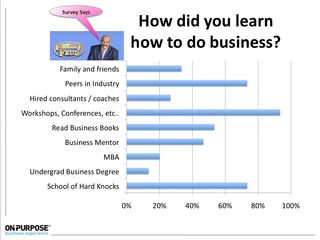Most people in business really don’t know what they are doing when it comes to the business of business.
It doesn’t mean they aren’t successful. It means they generally aren’t as successful as they could be. In a moment of candor, most of us will tell you that we’re plowing into virgin territory regularly. And what we’re doing for continuing education is generally a hodgepodge from a variety of sources.
A great solution is to join a peer learning group. More on those later in this post.
If you own a business and you don’t understand the foundations of business, then you’re likely functioning at 50% or less of your potential. Where else can you get an ROI (return on investment) like that for such little effort and energy expended?
Learn to be a Business Person
Most management and business training tend to be job specific or skills related. Overlooked are the fundamental concepts of business, the free enterprise system, and basics of what is called “general management” and business leadership. It is expensive to learn the basics of business.
Most businesses are built by—as Michael Gerber, author of The E-Myth Revisited: Why Most Small Businesses Don’t Work and What to Do About It, calls them—technicians who have an entrepreneurial seizure. They haven’t got a clue about being in business. Look no further than the professions of engineering, medicine, and law, for example, for really smart people who often don’t have a clue how to do business but are in business or own one. At least the professions have enough honesty to call them practices instead of businesses. : )
For years I’ve asked the question, “How did you learn how to do business?” The typical response is “School of Hard Knocks.” In other words, trial and error is the teacher—a cruel one at that. Check out the results of this small study I conducted with attendees of a previous webinar. (click on it to see a full-size version)
 A small percentage of people have undergraduate business degrees or an MBA.
A small percentage of people have undergraduate business degrees or an MBA.
Candidly, as a man with both an undergraduate business degree (BS from Lehigh University) and an MBA (University of Virginia Darden Graduate School of Business Administration), I’ll confess my college degrees prepared me with concepts, tools, language, and business context. They didn’t, however, turn me into a businessman. Degrees accelerate learning but they don’t make the person quite like being on the job does. We can’t avoid the School of Hard Knocks, but we can be prepared to learn the lessons faster, smarter, and less hard.
Becoming a Better Business Person
What are some of the ways to improve as a business person?
- Business consultants are an effective means for business improvement. Match a consultant’s strengths to your weaknesses and your business will prosper. Use consultants to set-up, fix, and refine systems where you lack the expertise or time to learn. This is especially helpful for those one-time set-ups such as an accounting system, putting up a website, or succession planning.
- Executive and business coaching are ways to improve as a business person on the job. Having someone come alongside and “teach you to fish” is important.
- Peer business owners outside and inside your industry. Generally, these are casual meetings where you learn from one another. Golf is often played!
- Associations often provide industry-specific training and resources. Tap into your association and see what they have to offer. Another great source is your Chamber of Commerce or local business development center. They often provide very reasonably priced training with local experts.
- Read books on business and leadership: Shameless pl
 ug coming … Read The On-Purpose Business Person and The On-Purpose Person. Together they lay the groundwork for leading a business and leading your life.
ug coming … Read The On-Purpose Business Person and The On-Purpose Person. Together they lay the groundwork for leading a business and leading your life. - Peer Learning to the rescue: One of the most overlooked programs for business training is non-competitive, facilitated, peer learning groups. In Napoleon Hill’s classic book Think and Grow Rich, he introduces the business idea of mastermind groups. These are generally self-managed versus having third-party facilitators who prepare the agenda and lead the group. Peer learning groups are also called business roundtables or CEO groups. The power of having peer learning grows your learning exponentially because the groups typically involve business training, reading business books, special learning programs, or technologies. In other words, they combine all the ways we learn plus the many benefits I’ve outlined in this On-Purpose Business Minute.
Here are some recommended resources for peer learning groups:
- CEO: Colleagues of Executive Online: John Smith, the founder of CEO, pioneered the concepts of business roundtables for Christians in 1989. In April of 1990, I joined one of John’s CEO groups. He’s been a mentor and friend ever since. John now offers virtual groups leveraging video conferencing. I’m a co-chair of a group with John.
- Vistage International: I know several people who participate in, speak to, or chair Vistage groups. Generally, Vistage members are running businesses with a minimum of ten or more employees. Dave Zerfoss in Charlotte, NC, is a personal friend and top-notch chair. Connect with him directly if this interests you.
- C12: I know Buck Jacobs, the founder of C12, as well as many members and chairs. C12 is designed for the Christian business person. In Orlando, connect with Kevin Respress.
- Peerspectives Roundtables: Peerspectives is both a group as well as a specific technique developed by the Edward Lowe Foundation. The Peerspectives technique provides a structured approach to problem-solving and sharing. A friend of mine, Steve Quello, uses this approach in Florida.
- Christian Roundtable Groups are sponsored by Truth@Work and are designed for solo owner or SOHO operators.
- The Advisory Board has been around for decades. I don’t have personal experience or relationships there but given its long-standing presence, I have to believe they offer excellent value and opportunity to grow.
So there’s my short list of recommendations for bolstering your business skills, concepts, and relationships. If you are serious about growing your business to the next level, then run, don’t walk to find yourself a peer learning group.